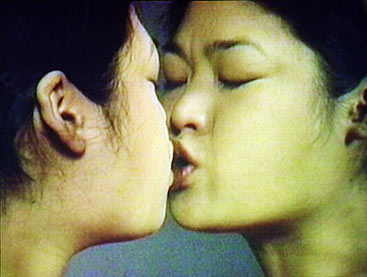
Born in 1972 in San Francisco, California (US)
Lives and works in New York (US)

1999
Video, colour, sound
Durée : 5'29"
Year of Purchase: 2001
Patty Chang’s work follows on from research by artists of the 1970s in which the performance was often thought in terms of endurance. However, what sets her apart from these elders she claims to come after is that she demystifies, with great humour and irony, the very place of the Artist so as to have a broader impact on her contemporaries, either in real time or through films or pictures excerpted from her performances.
In Fountain, Patty Chang stares at her face in a round mirror placed on the floor and covered in water which she slurps up noisily. For this performance, which took place in the toilet of a company restaurant, she chose a close-up angle with no reference to the context from which it has been taken. The video shows what ought to be running, but is actually stagnant, water and refers here to a cold, implacable sensuousness, further emphasized by zooming in on the double face. In this ‘facing up to herself’, she engages in some intense seduction that takes place in a state of self-absorption or self-hypnosis where the slurping noise coarsely conveys the meaning of what she is doing.
This crude delivery of the reflected, absorbed image uncovers a process of reasoning by analogy where the time-honoured symbols of water and mirrors are revisited. This association leads to a more general relationship which, as the artist emphasizes, lets us add on our own narrative – all interpretations are possible. So we may identify the metaphor of the struggle, of success and defeat, of self-projection in this introspection that as children and adults alike we carry out at certain times of our lives more or less given over to self-contemplation.
Patty Chang uses her main tool which is her body, while also issuing all necessary instructions for preserving a trace of her actions. So there is no question here of linking the artist to any one particular identity, but rather of assessing what is being got across while ignoring her belonging to any culture. ‘I was obsessed with the idea of a flat surface and the illusion of depth that it involves, it is a superficial abyss. Baudrillard wrote how seduction means to die as a reality and to be reconstituted as an illusion. Looking at yourself is an act of seduction, the action of looking at yourself becomes a cycle of life and death, and drinking is acceptance of that cycle.’ If water is the source of life, purification and regeneration, the mirror is of course a means and space for revelation. Water is also a symbol of the unconscious energies, the shapeless powers of the soul. Like water, the mirror is also sometimes used in rituals in a divinatory form. Light is reflected in the water without actually entering it. Also, the mirror projects a disturbing reversed image of reality.
As it seeks in its infiniteness a truth, a self-determined sincerity, Fountain reveals secret, unknown motivations.
Cécile Bourne